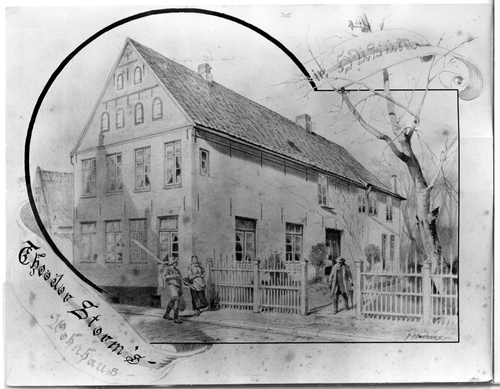Wasserreihe 31
Storm, who married Dorothea Jensen in 1866, bought Wasserreihe 31 the same year. The construction and usage history of this building has been partially researched and is quite complicated overall. The front part of the building dates back to around 1730/40 and replaced a building that may have been from the late Middle Ages. Storm had the back part built in 1868.
In 1868, the office of the bailiff was discontinued, Storm became district judge at the Prussian district court in Husum. Taking this position, however, meant his wages decreased by a third. Storm felt the need to rent out the lower floor of his house. The bailiffs office was originally on this lower floor, which was no longer needed, because the Prussian state had rented rooms in Husum for the district court.
“It was very still in the great house; but even in the hall one detected the scent of fresh flowers. Out of one of the double doors which faced the broad stairway leading to the upper storey stepped a neatly dressed old servicewoman.”
Viola tricolor, 1874
The Storm family moved to the upper floor of the Wasserreihe 31. The poets study was in the rear extension of the upper floor, the “Poetenstübchen” (Ferdinand Tönnies), in which numerous novellas, other prose works and poems were written. The house is the setting for the novella Viola tricolor.
Theodor Storm lived in this house for 14 years, in 1880 the family moved to Hademarschen in Holstein. In 1969 the city of Husum acquired the house and made it available to the Storm Society. It is the home of the Storm museum since 1972. The atmosphere of the “Storm period” was reconstructed with loving attention to detail by purchasing numerous furnishings from Storm’s estate. They are impressively supplemented by documents on Storm’s life and work.
Text by Holger Borzikowsky (1947–2015)
Translation by Bjarne Albertsen



